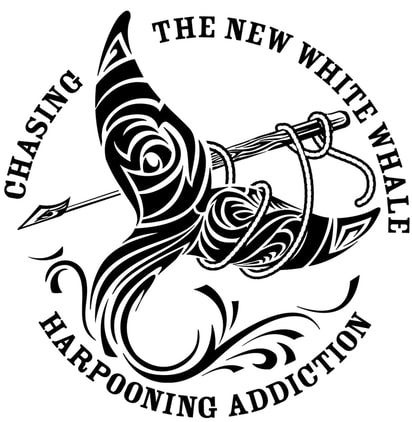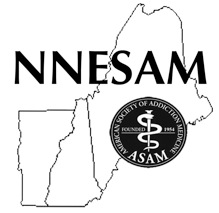
Chasing the New White Whale-Harpooning Addiction (No CME) by Michael Gorman Playwright/Director
Michael Gorman will describe this unique ongoing Arts and Advocacy program based in Rockland Maine. This theater-based series confronts audiences with the devastation caused by the opiate epidemic in New England fishing communities and beyond. A 30-minute video will include footage from live productions and interviews with performers who are in recovery.

About the speaker: Mike Gorman is a playwright, director, installation and experimental theater artist, and founder of “The Forty Hour Club”—his theatrical production company based in Rockland, Maine. His work focuses on the economic, environmental and systemic challenges facing working communities, and the paramount issue of sustainability. He is also a Playwright in Residence at La MaMa Experimental Theater Club in New York City.

Brain Injury in People with Substance Use Disorders (2 hours) by Carolyn Lemsky, PhD Clinical Neuropsychologist Director of the Toronto based Substance Use/Brain Injury Bridging Project Clinical Director, Community Head Injury Resource Services (CHIRS)
Overview of brain injury in people with SUD– risk factors, mechanisms, epidemiology, functional deficits. Epidemiology of overdose in opiate use disorder. Brain injury in survivors of overdose.
Overview of the neurocognitive and neuro-behavioural impact of opioid use. Incorporating accommodations and evidence-based practices to address neurocognitive and neurobehavioural impairment in the context of substance use disorders.
Learning Objectives:
- Attendees will know the prevalence of brain injury in people seeking services to address substance use disorders.
- Attendees will know best practices for recognizing the symptoms of brain injury, and how brain injury may interfere with treatment.
- Attendees will be able to identify evidence-based practices that may be applied to co-occurring brain injury and substance use disorders.
About the Speaker: Dr. Lemsky is a board certified clinical neuropsychologist with over 25 years of experience working with people who are living with the combined challenge of brain injury, serious mental illness and substance use disorders. is a board-certified neuropsychologist and Clinical Director at Community Head Injury Resource Services (CHIRS) of Toronto. Along with her partners at the Center for Addictions and Mental Health (CAMH), she has trained over 2000 mental health, addictions and acquired brain injury (ABI) providers in basic skills needed to promote the development of more accessible addictions programming for people living with substance use and ABI.

Pediatric Poisoning Involving Liquid Methadone, Buprenorphine, Cannabis Edibles, and Vaping Cartridges (1 hour) by Karen Simone, Pharm D Toxicologist, DABAT, FAACT, Director, Northern New England Poison Center, Maine Medical Center
The speaker will describe the poisoning problem for very young children due to cannabis, buprenorphine, methadone and vaping cartridges of nicotine and cannabis. She will present northern New England and national statistics of these incidents, and discuss the type and severity of clinical effects as well as the circumstances involved. She will also offer primary care and addiction care providers useful information for counseling patients in order to prevent these incidents.
Learning Objectives:
- Attendees will describe poisoning risks for children who ingest cannabis edibles, liquid methadone, buprenorphine, and vaping cartridges.
- Attendees will have information to effectively counsel their patients to decrease pediatric poisoning with these substances.
Cannabis and Driving. What is Known. What Can Providers Do? by Karen Simone, Pharm D Toxicologist, DABAT, FAACT, Director, Northern New England Poison Center, Maine Medical Center
- Pharmacokinetics of various forms and routes of delivery of cannabis.
- Pharmacodynamics-how cannabis affects brain functions involved with safe driving.
- Time course of cannabis effects on driving after use.
- Effects of combining cannabis with alcohol and other substances and medications.
- How to counsel people who use cannabis regarding driving.
Learning Objectives:
- Attendees will discuss the scientific basis for concerns associated with cannabis-impaired driving.
- Attendees will counsel patients regarding the dangers of cannabis use and driving.
About the speaker: Dr. Karen Simone is the director of the Northern New England Poison Center serving Maine, Vermont and New Hampshire. She is a doctor of pharmacy, a Diplomate of the American Board of Applied Toxicology and a Fellow of the American Academy of Clinical Toxicology. Dr. Simone oversees the day-to-day operations of the poison center, including management of calls, emergency preparedness activities, staff education, educational outreach, research and funding.

Nicotine Vaping – What Should Providers Tell Their Patients? What About that Cough by Jonathan C. Fellers MD, Private Practice Board-Certified in Addiction Psychiatry, Addiction Medicine, and Psychiatry
Basic information about inhalation of vaporized nicotine (vaping) will be provided including the pharmacology, products, epidemiology, and patterns of use. Patients sometimes turn to electronic nicotine delivery systems (ENDS) as a way to decrease or stop smoking. Risks of using ENDS, including nicotine use disorder and EVALI (E-cigarette including cannabis and Vaping Associated Lung Injury) will be described. Counseling approaches for people who use ENDS will be outlined. This presentation will review the current evidence for using ENDS for smoking cessation. A synthesis of evidence-based approaches to smoking cessation will be provided.
Learning Objectives:
- Attendees will be equipped with up-to-date information about evidence-based medication approaches to smoking cessation.
- Attendees will be able to counsel patients re: the risks of ENDS and the evidence for using ENDS as an approach to smoking cessation.
- Attendees will report an increased awareness of ENDS as a potential cause of pulmonary symptoms in their patients.
About the speaker: Dr. Fellers is Adjunct Assistant Clinical Professor in the Department of Psychiatry, Tufts University Medical School, and Medical Director for Crossroads and Foundation House in Portland Maine. He is an addiction psychiatrist who promotes high quality evidence-based screening, assessment, and treatment for substance use disorders and co-occurring mental disorders. Dr. Fellers held various roles in medical and graduate medical education over the past 10 years, serving as a lecturer, mentor, site supervisor, rotation supervisor, and program director. He delivers CME presentations at the local, regional, and national levels. He developed the curriculum for the Addiction Medicine Fellowship at Maine Medical Center.

Low Barrier Buprenorphine – What Does It Look Like? What is the Evidence? by Andrew Seaman, MD Vermont Medical Director, Better Life Partners
Associate Professor of Medicine, Oregon Health & Sciences University
- Review of the evidence surrounding low barrier buprenorphine treatment
- Description and data from the FLEX model, a Better Life Partners experimental pilot program providing on-demand harm reduction buprenorphine therapy in rural syringe service settings in Vermont
- Discussion of systemic obstacles to providing low barrier buprenorphine treatment
Learning Objectives:
- Knowledge of the current research supporting the efficacy of low barrier buprenorphine treatment.
- An improved understanding of what is needed to make for low barrier buprenorphine treatment widely available and successful.
About the Speaker: Andy Seaman is a father, an artist, and traveler based in East Montpelier, Vermont. He is also a harm reductionist, addition medicine and internal medicine specialist, and hepatitis C elimination expert with a decade of experience providing trauma informed care to people who use drugs. He is the Vermont Medical Director of Better Life Partners, an Associate Professor of Medicine at Oregon Health & Sciences University, and the Medical Director of Hepatitis and HIV Services at Portland, Oregon’s Central City Concern.
As an activist for the rights of people who use drugs, Andy’s research and clinical focuses are at the intersection of hepatitis C and injection drug use, the development of humane pathways for buprenorphine induction, and the implementation of harm reduction into health systems. He has a passion for policy change that centers the rights and empowerment of those who use drugs and he has helped shift the state and national agenda surrounding drug use decriminalization, overdose prevention sites, and the removal of prior authorization as a barrier to our community’s well being and autonomy.
Andy finds pleasure and meaning in building new systems of care that put the lives and experiences of people who use drugs first.
